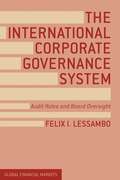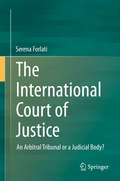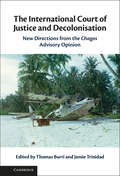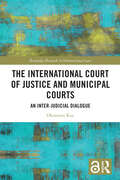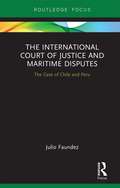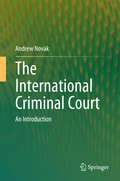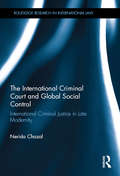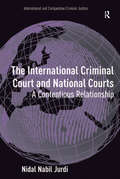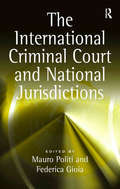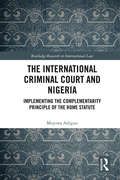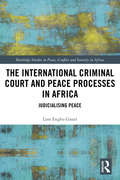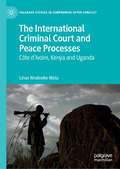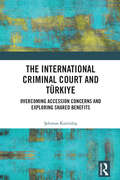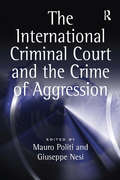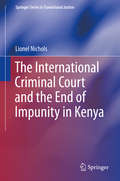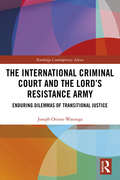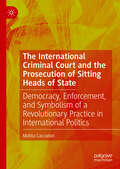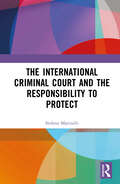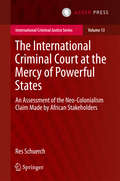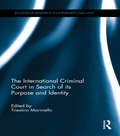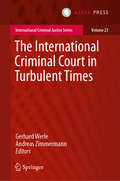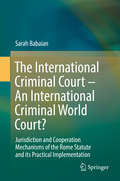- Table View
- List View
The International Corporate Governance System
by Felix I. LessamboThis book provides a comprehensive approach to Corporate Governance, Audit Process and Risk Management. Furthermore, it provides an analytical and comprehensive approach of the issues facing governance directors, internal and external auditors, risk managers, and public officials conducting assessments based upon the Report on Standards and Codes.
The International Court of Justice
by Serena ForlatiThe International Court of Justice is the principal judicial organ of the United Nations, and epitomizes the very notion of international judicial institution. Yet, it decides inter-State disputes only with the parties' consent. This makes it more similar to international arbitral tribunals than other international courts. However, the permanent nature of the Court, the predetermination of procedural rules by the Statute and the Rules of Court, the public character of proceedings, the opportunity for third States to intervene in a case under Articles 62 and 63 of the Statute and the Court's role as the principal judicial organ of the United Nations mark a structural difference between the ICJ and non-institutionalized international arbitral tribunals. This book analyses if and to what extent these features have influenced the approach of the ICJ (and of the PCIJ before it) to its own judicial function and have led it to depart from the principles established in international arbitration.
The International Court of Justice and Decolonisation: New Directions from the Chagos Advisory Opinion
by Jamie Trinidad Thomas BurriThe 2019 Chagos Advisory Opinion of the International Court of Justice is a decision of profound legal and political significance. Presented with a rare opportunity to pronounce on the right to self-determination and the rules governing decolonization, the ICJ responded with remarkable directness. The contributions to this book examine the Court's reasoning, the importance of the decision for the international system, and its consequences for the situation in the Chagos Archipelago in particular. Apart from bringing the Chagossians closer to the prospect of returning to the islands from which they were covertly expelled half a century ago, the decision and its political context may be understood as part of a broader shift in North/South relations, in which formerly dominant powers like the UK must come to terms with their waning influence on the world stage, and in which voices from former colonies are increasingly shaping the institutional and normative landscape.
The International Court of Justice and Municipal Courts: An Inter-Judicial Dialogue (Routledge Research in International Law)
by Oktawian KucRecent decades have brought international and municipal courts much closer together and induced meaningful cooperation. This holds true also for the International Court of Justice and domestic judicial institutions as they engage actively in an inter-judicial dialogue, particularly on the normative level. Due to the impact of globalisation and internationalisation, the World Court has expanded its jurisprudence to also accommodate references and analysis of external judicial organs and their pronouncements. Likewise, ICJ decisions are referred to and consulted by municipal courts as authoritative statements of international norms or assistance in fact determination. This monograph examines this inter-judicial dialogue in a comprehensive manner by identifying and analysing all its aspects as evidenced in respective jurisprudence. Surprisingly, the mutual conversation in judicial decisions between the World Court and national judicial institutions has drawn little attention from international legal scholarship, and the book is designed to fill this lacuna.
The International Court of Justice and Municipal Courts: An Inter-Judicial Dialogue (Routledge Research in International Law)
by Oktawian KucRecent decades have brought international and municipal courts much closer together and induced meaningful cooperation. This holds true also for the International Court of Justice and domestic judicial institutions as they engage actively in an inter-judicial dialogue, particularly on the normative level. Due to the impact of globalisation and internationalisation, the World Court has expanded its jurisprudence to also accommodate references and analysis of external judicial organs and their pronouncements. Likewise, ICJ decisions are referred to and consulted by municipal courts as authoritative statements of international norms or assistance in fact determination.This monograph examines this inter-judicial dialogue in a comprehensive manner by identifying and analysing all its aspects as evidenced in respective jurisprudence. Surprisingly, the mutual conversation in judicial decisions between the World Court and national judicial institutions has drawn little attention from international legal scholarship, and the book is designed to fill this lacuna.The Open Access version of this book, available at http://www.taylorfrancis.com, has been made available under a Creative Commons [Attribution-Non Commercial-No Derivatives (CC-BY-NC-ND)] 4.0 license.
The International Court of Justice in Maritime Disputes: The Case of Chile and Peru (Routledge Research on the Law of the Sea)
by Julio FaundezThe origins of the maritime dispute between Chile and Peru go back to 1952, when these countries, along with Ecuador, asserted sovereignty over 200 nautical miles from their coasts. This maritime claim is widely regarded as one of the most important contributions by a group of developing countries to the law of the sea. Peru then asked the Court of International Justice to delimit its lateral boundary with Chile in accordance with principles of international law. Chile asked the Court to dismiss the request. The question before the ICJ Justice was whether the treaty concluded by the parties when they made their claim had also delimited their lateral boundary. This book provides a critical analysis of the approach to treaty interpretation by the International Court of Justice in Maritime Disputes. Focusing on the case of Chile and Peru, the book explores two main issues: the interpretation of the Santiago Declaration and its connected treaties; and the tacit agreement that established a lateral maritime boundary with a seaward extension of 80 nautical miles. Part I argues that the Court’s finding that the Santiago Declaration did not delimit the lateral boundary is mistaken because it ignores its context, as well as its object and purpose. Part II argues that the finding that the parties had entered into a tacit agreement is an unjustified legal inference derived from a hasty interpretation of the Special Agreement of 1954. It questions that the reliability of the evidence used to determine the seaward extent of the lateral boundary and argues that the Court failed to demonstrate the bearing of contemporaneous developments in the law of the sea on the content of the tacit agreement.
The International Criminal Court
by Andrew NovakThis book is about the International Criminal Court (ICC), a new and highly distinctive criminal justice institution with the ability to prosecute the highest-level government officials, including heads of state, even in countries that have not accepted its jurisdiction. The book explores the historical development of international criminal law and the formal legal structure created by the Rome Statute, against the background of the Court's search for objectivity in a political global environment. The book reviews the operations of the Court in practice and the Court's position in the power politics of the international system. It discusses and clarifies all stages of an international criminal proceeding from the opening of the investigation to sentencing, reparations, and final appeals in the context of its restorative justice mission. Making appropriate comparisons and contrasts between the international criminal justice system and domestic and national systems, the book fills a gap in international criminal justice study.
The International Criminal Court and Complementarity
by Carsten Stahn Mohamed M. El ZeidyThis systematic, contextual and practice-oriented account of complementarity explores the background and historical expectations associated with complementarity, its interpretation in prosecutorial policy and judicial practice, its context (ad hoc tribunals, universal jurisdiction, R2P) and its impact in specific situations (Colombia, Congo, Uganda, Central African Republic, Sudan and Kenya). Written by leading experts from inside and outside the Court and scholars from multiple disciplines, the essays combine theoretical inquiry with policy recommendations and the first-hand experience of practitioners. It is geared towards academics, lawyers and policy-makers who deal with the impact and application of international criminal justice and its interplay with peace and security, transitional justice and international relations.
The International Criminal Court and Global Social Control: International Criminal Justice in Late Modernity (Routledge Research in International Law)
by Nerida ChazalThe International Criminal Court was established in 2002 to prosecute war crimes, crimes against humanity, and genocide. At its genesis the ICC was expected to help prevent atrocities from arising or escalating by ending the impunity of leaders and administering punishment for the commission of international crimes. More than a decade later, the ICC’s ability to achieve these broad aims has been questioned, as the ICC has reached only two guilty verdicts. In addition, some of the world’s major powers, including the United States, Russia and China, are not members of the ICC. These issues underscore a gap between the ideals of prevention and deterrence and the reality of the ICC’s functioning. This book explores the gaps, schisms, and contradictions that are increasingly defining the International Criminal Court, moving beyond existing legal, international relations, and political accounts of the ICC to analyse the Court from a criminological standpoint. By exploring the way different actors engage with the ICC and viewing the Court through the framework of late modernity, the book considers how gaps between rhetoric and reality arise in the work of the ICC. Contrary to much existing research, the book examines how such gaps and tensions can be productive as they enable the Court to navigate a complex, international environment driven by geopolitics. The International Criminal Court and Global Social Control will be of interest to academics, researchers, and advanced practitioners in international law, international relations, criminology, and political science. It will also be of use in upper-level undergraduate and postgraduate courses related to international criminal justice and globalization.
The International Criminal Court and National Courts: A Contentious Relationship (International And Comparative Criminal Justice Ser.)
by Nidal Nabil JurdiThis book analyzes the position of the ICC in relation to national court systems. The research illustrates that what seemed to be a straight forward relationship between the ICC and national courts under the complementarity mechanism, proves to be much more complex in practice. Using the referrals of Uganda and Darfur, the book demonstrates ways in which it might be possible to prosecute for crimes currently not prosecuted by the ICC and brings to light possible solutions to overcome the gaps in law and practice in the jurisdictional relation between the ICC and national systems. It will be of value to academics, students and policy-makers working in the area of international law, international organizations, and human rights.
The International Criminal Court and National Jurisdictions
by Federica GioiaAt a stage in its development when the workings of the International Criminal Court may be assessed, this timely volume provides valuable insights into its activities and, in particular, its interaction with national jurisdictions and international organizations. The contributors discuss a broad range of topics and present a 'first assessment' of complementarity. They address the issues at the heart of the substantive and procedural law of the Court and examine aspects relating to national implementation and international cooperation. These proceedings are the latest addition to the Trento Conference series, bringing together a wide range of leading scholars, diplomats and representatives of international organizations. As such, they provide an important contribution to the ongoing debate surrounding International Criminal Law and the International Criminal Court in particular. This thought-provoking study will be of value to researchers and policy makers alike.
The International Criminal Court and Nigeria: Implementing the Complementarity Principle of the Rome Statute (Routledge Research in International Law)
by Muyiwa AdigunIf Nigeria fails to prosecute the crimes recognised under the Rome Statute, then the International Criminal Court (ICC) will intervene. The ICC is only expected to complement the criminal justice system in Nigeria and is not a court of first instance, but one of last resort. This is what is known as the principle of complementarity. Before the ICC can step in, it must make a finding of ‘unwillingness’ or ‘inability’ on the part of Nigeria. It is only after this finding is made that the ICC can take over the prosecution of the crimes recognised under the Statute from Nigeria. This book examines the criminal justice process in Nigeria and discovers that the justice system is latent with the requirements of ‘unwillingness’ and ‘inability.’ The requirements, which serve as tests for assessment, are as they are laid down by the Rome Statute and interpreted by the ICC. This book offers recommendations as to what Nigeria must do in order to avoid the ICC intervention by reversing those parameters that give rise to ‘unwillingness’ and ‘inability.’ The International Criminal Court and Nigeria: Implementing the Complementarity Principle of the Rome Statute offers a contribution to the advancement of international law and will be of practical use to African countries. It aims to sensitise policy makers in different African countries in respect of policy options open to them to close impunity gap in their respective countries. This volume addresses the topics with regard to international criminal law and comparative public law and will be of interest to researchers, academics, organizations, and students in the fields of international law, governance, and comparative criminal justice.
The International Criminal Court and Peace Processes in Africa: Judicialising Peace (Routledge Studies in Peace, Conflict and Security in Africa)
by Line GisselThe book investigates how involvement by the International Criminal Court (ICC) affects efforts to negotiate peace. It offers an interpretive account of how peace negotiators and mediators in two peace processes in Uganda and Kenya sought to navigate and understand the new terrain of international justice, while also tracing how and why international decision-making processes interfered with the negotiations, narrated the conflicts and insisted on a narrow scope of justice. Building on this interpretive analysis, a comparative analysis of peace processes in Uganda, Kenya and Colombia explores a set of general features pertaining to the judicialisation of peace. Line Engbo Gissel argues that the level and timing of ICC involvement is key to the ICC’s impact on peace processes and explains why this is the case: a high level of ICC involvement during the negotiation phase of a peace process delegates politico-legal and discursive authority away from peace process actors, while a low level of ICC involvement during the negotiation phase retains such forms of authority at the level of the peace process. As politico-legal authority enables the resolution of sticking points and discursive authority constructs the conflict and its resolution, the location of authority is important for the peace process. Furthermore, judicialisation also affects the negotiation and implementation of a justice policy, with a narrowing scope for justice accompanying increasing levels of ICC involvement.
The International Criminal Court and Peace Processes: Cȏte d’Ivoire, Kenya and Uganda (Palgrave Studies in Compromise after Conflict)
by Linus Nnabuike MaluThis book explores the extent to which the International Criminal Court (ICC) has influenced peace processes in Cȏte d’Ivoire, Kenya and Uganda. It examines how the prosecution of those who bear the greatest responsibility for crimes committed in these countries may have negatively or positively influenced the process of making peace in their wake. It is concerned with how international accountability affects post-conflict countries and what the ICC brings to peace processes. The central question addressed by the book is whether justice spurs peace in post- conflict societies or whether justice complicates the peace process. If so, how? Relying on qualitative studies in these countries, this book comparatively analyses the impact of the interventions of the ICC in Uganda (2004), Kenya (after the 2007/2008 post-election violence), and Cȏte d’Ivoire. Its aim is to provide an evidence-based account of how the involvement of the ICC in these countries influences the processes of promoting peace. To gauge this, Malu develops an analytical framework which is based on four variables: deterrence, victims’ rights, reconciliation and accountability to the law. This book will appeal to those interested in post-conflict reconstruction, transitional justice, peace studies, conflict transformation, and international criminal law, including peace practitioners and those working in the field of international justice.
The International Criminal Court and Türkiye: Overcoming Accession Concerns and Exploring Shared Benefits
by Şehmus KurtuluşThe establishment of the International Criminal Court (ICC) is a landmark development in the field of international criminal law, marking a significant step forward in the pursuit of global justice. Having gained the recognition of 125 states, the ICC stands as the world’s first and only permanent international tribunal capable of trying individuals for the gravest crimes of international concern. This book provides a comprehensive analysis of the challenges and opportunities associated with becoming a member of the ICC, using Türkiye as a case study to explore broader issues relevant to other states that have not yet joined the Court. It argues that the concerns behind Türkiye’s reluctance to sign the founding treaty of the ICC are not substantial enough to justify avoiding the Court’s jurisdiction and that non-accession does not guarantee immunity from ICC oversight. While primarily focused on Türkiye, the book offers insights that could inform the decisions of other non-signatory states, particularly those with similar reservations about the Court. It demonstrates that the advantages Türkiye stands to gain by joining the ICC are largely applicable to other non-signatory states as well. Through this analysis, the book underscores the ICC's critical role as a global institution and its invaluable contribution to advancing international criminal justice. Presenting a valuable overview of the world’s first and only permanent international criminal court, the work will be a valuable resource for academics, researchers and policymakers working in the fields of International Law and International Relations.
The International Criminal Court and the Crime of Aggression
by Mauro PolitiThe Rome Statute of the International Criminal Court entered into force in 2002 and the ICC will soon be fully operational. Earlier in the ICC process, an international conference was held in Trento to address a specific issue that is still unresolved in the post-Rome negotiations: the crime of aggression. Article 5 of the ICC Statute includes aggression, yet the Statute postpones the exercise of its jurisdiction over the crime of aggression until such time as further provisions have been prepared on the definition of this crime and on the related conditions for the Court's intervention. This important volume collects the papers given by the participants at the Trento Conference. The volume is divided into three parts: the historical background of the crime of aggression; the definition of the crime of aggression, in light of proposals in the Preparatory Commission; and various points of view on the relationship between the Court's competence in adjudicating cases of alleged crimes of aggression and the Security Council's competence.
The International Criminal Court and the End of Impunity in Kenya
by Lionel NicholsThe period immediately following Kenya's 2007 presidential election left a shocking trail of atrocities, with over 1,000 people dead and countless thousands left victimised and displaced. In response, the International Criminal Court began a series of investigations and trials, promising no impunity for even the highest ranking perpetrators. When the country's president and vice-president were implicated in the crimes, the case took on worldwide significance. The International Criminal Court and the End of Impunity in Kenya is a five-year study addressing critical human rights issues with a global reach and is the first detailed account of the ICC's intervention in Kenya. It probes the relationship between the ICC and state institutions, known as positive complementarity, and asks whether the ICC's intervention led to an end to impunity. The author provides comprehensive analysis of the Waki Commission's sealed envelope, the government's attempts to establish a special tribunal and the trials in The Hague. He also provides in depth consideration of any influence the ICC's intervention may have had on the passing of a new constitution, the establishment of a truth commission and important reforms to the judiciary, police and witness protection programme. Documenting the effects of these interventions on the Kenyan people, and on the country's legal and judicial systems, the book provides vital lessons in global justice as it: *Details the ICC's involvement in Kenya in the aftermath of extreme violence and instability *Evaluates the ICC prosecutor's strategy of positive complementarity *Identifies optimal conditions for positive complementarity to be effective *Links cultures of impunity to state-sponsored corruption *Explores the possible impact of the ICC on national and global policy *Discusses implications in responding to future crimes against humanity Replete with official government sources, The International Criminal Court and the End of Impunity in Kenya is necessary reading for researchers and practitioners working in public international law, particularly those specialising in conflict and post-conflict states.
The International Criminal Court and the Lord’s Resistance Army: Enduring Dilemmas of Transitional Justice (Routledge Contemporary Africa)
by Joseph Otieno WasongaThis book interrogates the sharp contrast that emerged between demands of the norms of international rule of law and the interests of conflict resolution at a local level in northern Uganda. Examining how the nature and character of complex conflict situations like that of northern Uganda confounds the application of transitional justice mechanisms, The International Criminal Court and the Lord’s Resistance Army reveals the enduring dilemmas of transitional justice. Scrutinising the competing interests of punitive approaches to contemporary transitional justice and the political considerations for peace that may entail entering into dialogue with criminals, this book approaches such concepts from the perspective of international standards and the standpoint of the victims. While exploring the complexities of transitional justice processes, the book interrogates prevailing assumptions, proposing a broader conception that places at the centre local structural conditions associated with a conflict. The International Criminal Court and the Lord’s Resistance Army will be of interest to scholars and students of international law, African politics and conflict studies.
The International Criminal Court and the Prosecution of Sitting Heads of State: Democracy, Enforcement, and Symbolism of a Revolutionary Practice in International Politics
by Mattia CacciatoriThe practice of prosecuting sitting Heads of State (SHoS) by the International Criminal Court (ICC) represents a revolutionary and morally compelling pursuit of justice for those who commit the most heinous crimes known to humanity, regardless of their status. This book embarks on an exploration of the intricate political dynamics surrounding this complex practice, delving into six pivotal cases where the ICC grappled with the idea of prosecuting SHoS. These cases include Uganda, Sudan, Kenya, Libya, Syria, and Russia, encompassing all instances where the ICC directly targeted SHoS, as well as two cases where the Court was unable or unwilling to act. The investigation focuses on the multifaceted political complexities involved in initiating investigations against SHoS. It also delves into the far-reaching domestic and international consequences these prosecutions carried, profoundly impacting both the host societies and the international arena.
The International Criminal Court and the Responsibility to Protect
by Stefano MarinelliThis book examines the parallel development and interaction between the International Criminal Court (ICC) and the doctrine of the Responsibility to Protect (RtoP), assessing this relationship over time and through case studies of Darfur, Libya, and Syria. The similarities and connections between the doctrine and the Court have been highlighted by UN bodies, the organs of the Court, and scholars, yet their relationship and common impact on international law have been less explored. This book fills this gap in presenting an overview of how the development of RtoP and the ICC affect various branches of international law. The research shows that while the doctrine and the Court experienced significant implementation problems in their first decades of life, they nonetheless have the potential to contribute to the historical evolution of international law in combining their values of promoting international peace and protecting human rights. This interdisciplinary study will be useful for scholars of international law and international relations. It will also be beneficial to persons working for international organisations and for civil society organisations focused on the activity of the ICC and on the development of RtoP.
The International Criminal Court at the Mercy of Powerful States
by Res SchuerchThis book aims to investigate whether, and if so, how, an institution designed to bring to justice perpetrators of the most heinous crimes can be regarded a tool of oppression in a (neo-)colonial sense. To do so, it re-invents the concept of neo-colonialism, which is traditionally associated more with economic or political implications, from an international criminal law perspective, combining historical, political and legal analyses. Allegations of neo-colonialism in relation to the International Criminal Court (ICC) became widespread after the Court had issued an arrest warrant against the Sudanese President Omar Al-Bashir in 2009. While the Court, since its entry into function in 2002, has been confronted with criticism from various corners, the neo-colonialism controversy was sparked by African stakeholders. Unlike other contributions in this domain, thus, this book provides a Western perspective on an issue more often addressed from an African standpoint, with the intention of distinguishing itself from the more political and emotive and sometimes superficial arguments that exist within critical legal approaches towards the ICC. The subject matter will primarily be of interest to scholars of international criminal law or those operating at the intersection of law and politics/history, nationals of African states and from other parts of the world professionally interested and/or involved in international criminal law and justice and the ICC, and governmental and non-governmental organizations. Secondly, the book will also appeal and speak to critical legal scholars and those interested in historical legal analysis. Res Schuerch is a Swiss lawyer specialized in the field of International Criminal Law and the ICC. He previously worked as a researcher at the University of Amsterdam and as an academic assistant at the University of Z#65533;rich.
The International Criminal Court in Ongoing Intrastate Conflicts
by Patrick S. WegnerIn recent decades, international courts have increasingly started investigating armed conflicts. However, the impact of this remains under-researched. Patrick S. Wegner closes this gap via a comprehensive analysis of the impact of the International Criminal Court in the Darfur and Lord's Resistance Army conflicts. He offers a fresh approach to peace and conflict studies, while avoiding the current quantitative focus of the literature and polarisation between critics and supporters of applying justice in conflicts. This is the first time that the impact of an international criminal court has been analysed in all its facets in two conflicts. The consequences of these investigations are much more complex and difficult to predict than most of the existing literature suggests. Recurrent claims, such as the deterrent effect of trials and the danger of blocking negotiations by the issuing of arrest warrants, are put to the test here with some surprising results.
The International Criminal Court in Search of its Purpose and Identity (Routledge Research in International Law)
by Triestino MarinielloThe International Criminal Court (ICC) is the first permanent international criminal tribunal, which has jurisdiction over the most serious crimes of concern to the international community as a whole: genocide, crimes against humanity, war crimes, and crime of aggression. This book critically analyses the law and practice of the ICC and its contribution to the development of international criminal law and policy. The book focuses on the key procedural and substantive challenges faced by the ICC since its establishment. The critical analysis of the normative framework aims to elaborate ways in which the Court may resolve difficulties, which prevent it from reaching its declared objectives in particularly complex situations. Contributors to the book include leading experts in international criminal justice, and cover a range of topics including, inter alia, terrorism, modes of liability, ne bis in idem, victims reparations, the evidentiary threshold for the confirmation of charges, and sentencing. The book also considers the relationship between the ICC and States, and explores the impact that the new regime of international criminal justice has had on countries where the most serious crimes have been committed. In drawing together these discussions, the book provides a significant contribution in assessing how the ICC’s practice could be refined or improved in future cases. The book will be of great use and interest to international criminal law and public international law.
The International Criminal Court in Turbulent Times (International Criminal Justice Series #23)
by Gerhard Werle Andreas ZimmermannThe chapters in this book are reworkings of presentations given during a conference held in 2018 at the German Embassy to the Netherlands in The Hague on the occasion of the 20th anniversary of the adoption of the Rome Statute. They provide an in-depth analysis of major points of contention the International Criminal Court (ICC) is currently facing, such as, inter alia, head of state immunities, withdrawal from the Rome Statute, the exercise of jurisdiction vis-à-vis third-party nationals, the activation of the Court’s jurisdiction regarding the crime of aggression, as well as the relationship of the Court with both the Security Council and the African Union, all of which are issues that have a continued relevance and carry a particular controversy.The collection provides insights from both practitioners, including judges of the ICC, and diplomats who participated in the negotiations leading to the adoption of the Rome Statute, as well as well-known academics from various parts of the world working in the field of international criminal law.The aim of the book is not only to inform and stimulate academic debate on the topic, but also to serve as an instrument for lawyers involved in the practice of international criminal law.Gerhard Werle is Professor at the Faculty of Law of the Humboldt-University in Berlin, Germany and Andreas Zimmermann is Professor at the Faculty of Law of the University of Potsdam in Germany. Jürgen Bering, who worked on this book as assistant editor, is an Associate at Dentons, Berlin and a PhD candidate at the Martin Luther University, Halle-Wittenberg, Germany.
The International Criminal Court – An International Criminal World Court?: Jurisdiction And Cooperation Mechanisms Of The Rome Statute And Its Practical Implementation
by Sarah BabaianThis book provides an analysis of whether the International Criminal Court can be regarded as an International Criminal World Court, capable of exercising its jurisdiction upon every individual despite the fact that not every State is a Party to the Rome Statute. The analysis is based on a twin-pillar system, which consists of a judicial and an enforcement pillar. The judicial pillar is based on the most disputed articles of the Rome Statute; its goal is to determine the potential scope of the Court’s strength through the application of its jurisdiction regime. The enforcement pillar provides an analysis of the cooperation and judicial assistance mechanism pursuant to the Rome Statute’s provisions and its practical implementation through States’ practices. The results of the analysis, and the lack of an effective enforcement mechanism, demonstrate that the ICC cannot in fact be considered a criminal world court. In conclusion, possible solutions are presented in order to improve the enforcement pillar of the Court so that the tremendous strength of the ICC’s judicial pillar, and with it, the exercise of worldwide jurisdiction, can be effectively implemented.
